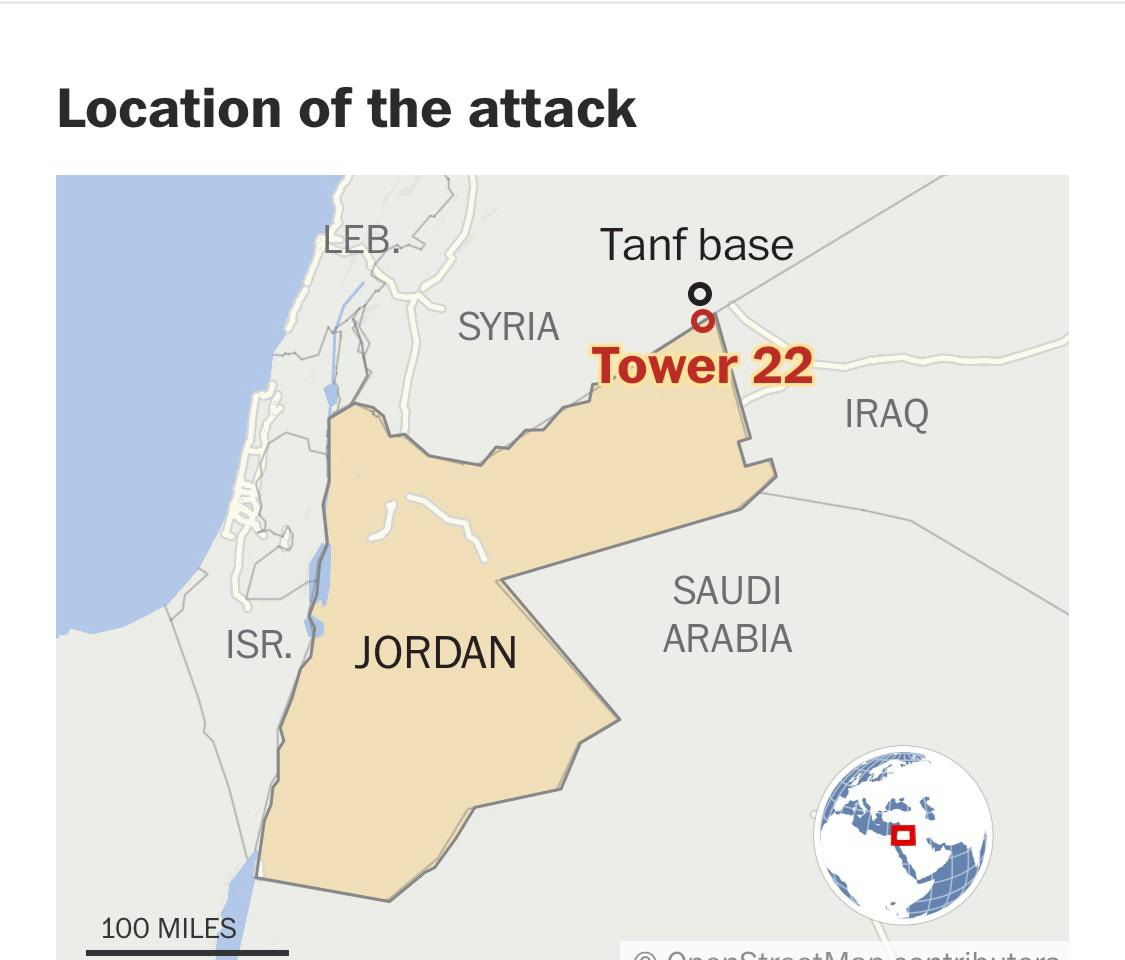Three U.S. Troops Killed, Many Wounded in Jordan Drone Attack Blamed on Iranian Proxies
A militant drone attack killed three U.S. service members and injured at least 34 in Jordan on Sunday, marking the first deadly military action against American troops since the Gaza conflict triggered a steep rise in Middle East violence.
Deadly Strike in Jordan: Overview of the Drone Attack
In a grim escalation in the Middle East, three U.S. service members were killed and over 30 wounded in a drone attack in northeastern Jordan, near the tri-junction of the Jordanian, Syrian, and Iraqi borders, on Sunday (January 28, 2024). This incident represents the first fatal assault on U.S. forces in the region since the onset of the Gaza War, which has led to heightened tensions across the Middle East.
President Biden's Response and Vow for Action
President Biden, speaking in South Carolina, lamented the loss of "three brave souls" in what he described as a difficult day in the Middle East, affirming that the U.S. would respond to this act of aggression. The President emphasized the patriotism and sacrifice of the fallen service members and vowed to hold the perpetrators accountable.
The Strategic Significance of Tower 22
This attack, targeting the Tower 22 facility in Jordan, has raised questions about the effectiveness of U.S. air defenses, as the drone managed to strike the base’s living quarters. U.S. Central Command reported that the injuries sustained by personnel range from minor cuts to serious brain trauma. In total, about 350 troops are stationed at this base, which has emerged as a critical support site for U.S. operations in the region.
Jordan's Delicate Balancing Act
Jordanian authorities, condemning the attack, reaffirmed their commitment to countering terrorism and cross-border smuggling from Syria. The Jordanian government spokesperson underscored the country's resolve to protect its security and sovereignty. This incident also brings into focus Jordan's delicate position, balancing its counterterrorism partnership with the U.S. against the regional backlash over the Gaza conflict and its relations with neighboring countries like Iran.
Iranian Proxies Suspected: Delving into the Allegations
The Islamic Resistance in Iraq, a coalition of Iranian-backed militias, claimed responsibility for the drone attack. This group, which includes factions like Kataib Hezbollah and Harakat Hezbollah al-Nujaba, openly declared that U.S. interests in the region would continue to be targeted as retaliation for U.S. support of Israel. The Iranian proxies' brazen disregard for U.S. warnings and threats underscores the escalating tensions and the complex geopolitical landscape in the Middle East.
US Retaliation Earlier
In response to this rising threat, the Biden administration earlier conducted a retaliatory strike on a militia base in central Baghdad, which was hoped to deter further aggression. However, the attacks have not only continued but have also grown in scale and ambition.
The strategic importance of Tower 22, and the broader network of U.S. bases in Iraq and Syria, primarily lies in their role in countering the Islamic State and curtailing Iran's influence in the region. The Tanf base, located near Tower 22, serves as a pivotal point for U.S. forces in their efforts to disrupt Iran's supply chains to its allies in Syria.
Calls for Stronger U.S. Action: Political Reactions
U.S. military improvements in drone defense have been noted, yet challenges remain in achieving complete security, as evidenced by this tragic incident. The call for a more assertive U.S. response to Iranian aggression is growing louder in the wake of this attack, with figures like Senate Minority Leader Mitch McConnell and Senator Lindsey Graham advocating for substantial punitive measures against Iran and its proxies.
Regional Instability and Global Implications
The escalating violence in the Middle East, highlighted by the recent drone attack in Jordan, presents significant challenges for the Biden administration as it endeavors to navigate the intricate web of regional politics and security concerns, with broader implications for international stability. In this often volatile region, threats extend beyond this single incident. The Houthi rebels in Yemen pose risks to the Red Sea's strategic maritime routes, including the Suez Canal, through their potential to disrupt vital shipping lanes. Additionally, ongoing conflicts include Saudi Arabia's military actions against militants in northern Yemen and recurring cross-border tensions between Pakistan and Iran. The situation is further complicated by Israel's strikes against Hezbollah targets in southern Lebanon, underscoring the delicacy required in managing these multifaceted regional dynamics.
India's Diplomatic Leverage in Middle Eastern Affairs
In the overall context of the ongoing Israel-Hamas conflict and otherwise, India's role as a potentially neutral, peace-promoting nation becomes increasingly significant. As a country traditionally adhering to a non-aligned stance in Middle Eastern affairs, India could play a more active role in fostering stability in the region. This potential for diplomatic engagement comes at a time when Indian Prime Minister Narendra Modi is preparing to inaugurate the BAPS Hindu Temple in Abu Dhabi on February 14, symbolizing not only India's cultural but also diplomatic outreach in the Middle East.





